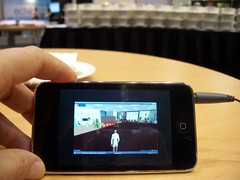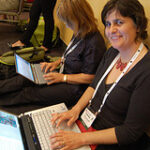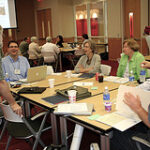
- Image by petaj via Flickr
Session 1: Sustainable Digital Literacy: (Peter Kandlbinder – UTS)
Expectations of the institution towards First Year digital literacy.
A range of “basic” technology skills are assumed.
Developing staff capacity (for quality elearning) (L Rankine – UWS)
90% of units have Bb site.
Qualitative statements about elearning
Selection of undergrad sites – quality was varied. But overall was diversity and complexity of use.
Implementation of elearning Quality Framework – basic to advanced standards.
Self review processes.
Multi-tiered approach – top down(advisory group PVC L&T), middle out (central unit, 3 seconded academics at school level), bottom up (pilot participants, )
Pilot showed 100% compliance with Basic Standards
Basic Standards embedded in all staff development activities.
Slower progress than anticipated.
Need to engage leaders.
mlearning (Romana Pospisil – ECU)
Surveyed about 120 students – laptops – connectivity
Talked of the “net generation” – probably not a useful distinction if your thinking in terms of birthdate.
Control of laptops and mobile tools seemed to generate a feeling of control over learning.
More devices will be evident in classrooms.
New strategies must be developed to accommodate at least the most basic of these devices.
Days of “head in the sand” are gone for educators.
==============================
EDUCAUSE 2009 – Australasia – My Impressions so far.
A lot more staid than PODCAMP/BARCAMP and nowhere near as active as Drama Education conferences.
Death by Powerpoint seems to be the order of the day!!
Session 2: Strategic Management for elearning (Andrew Higgins – Auckland U of Tech)
How to coordinate decision making practices regarding elearning –
did he really just suggest that Bb is preferable to opensource solutions??
Thumbs UP! someone asking us to DO something!!!
Major themes:
- strategy
- structure
- resources
- decision making
- collaboration
- technology selection
Change management must accompany structural and resource changes.
Improving Student Experience thru Collaboration (Ann Walters, U.Newcastle)
Changes to create a Student Commons… shifting away from general models of student/general computer labs was the intention – the original labs still exist…
24/7 access to equipment – software, printing, scanning, etc
wired and wireless access
F&B services
Student (behavioural) responses suggest that this combination is preferable to other available options.
Largely driven by IT services – pedagogy etc did not seem to play a part of any of this.
Significant increase in student use of laptops/netbooks – additional demands on wireless network – support systems devised special “Laptop Clinics” – trainers using identical strategies…
IT service insists on virus control and other prerequisites before they can connect.
Laptop provision program does not accommodate “high end” use – even at HRD level – if you’re doing anything practice-led or innovative then this doesn’t really help you. The statement was it will allow them write their thesis and do statistical analysis – so much for research paradigms beyond Quantitative models.
Academic Learning Support in Cyberspace (Teresa De Fazio, OUA)
Student cohort is often in the “underprepared” category.
Study looked at the “nurturing” aspects.
Expected student capabilities are not always present – scaffolding therefore required throughou early studies in OUA.
Beyond teaching staff, who else can support these students – academic learning support!
Example provided in terms of a requirement to create an annotated bibliography.
Related articles by Zemanta
- Assessing Impact: E-Portfolios in Higher Education (downes.ca)
- Empowering Faculty to Broaden Learning Boundaries: Making the Technology Transparent (tc.eserver.org)
- HEFCE’s “Enhancing learning and teaching through the use of technology” (iangardnergb.blogspot.com)
- ELI Podcast: The 2009 Horizon Report (downes.ca)

![Reblog this post [with Zemanta]](http://img.zemanta.com/reblog_a.png?x-id=562fa9e2-401b-8d31-9def-b2ca4b9ce850)





